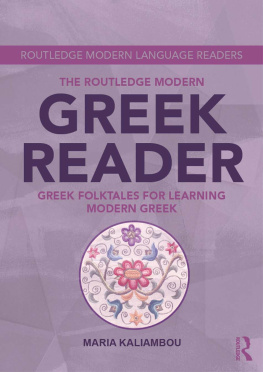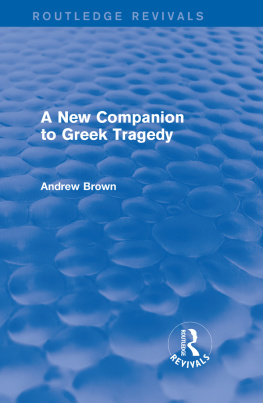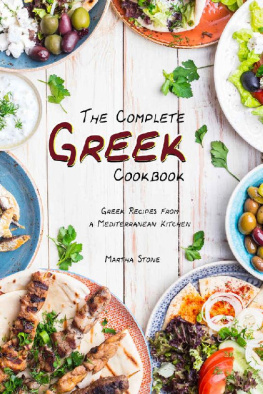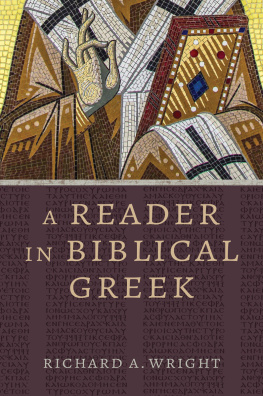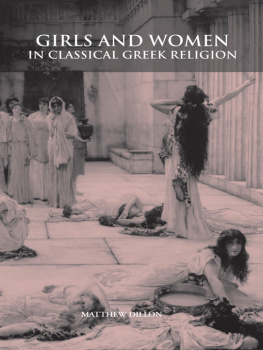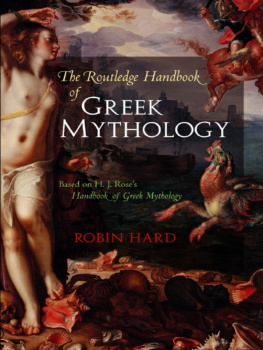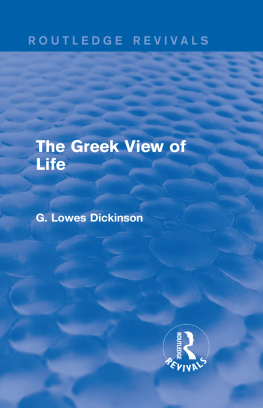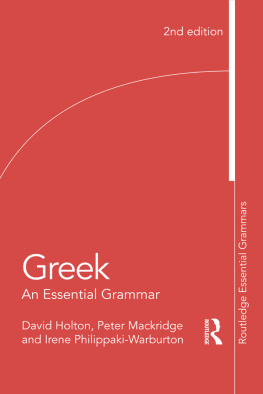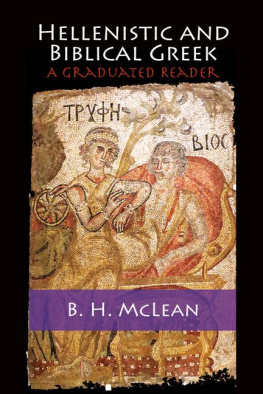Kaliambou - The Routledge Modern Greek Reader
Here you can read online Kaliambou - The Routledge Modern Greek Reader full text of the book (entire story) in english for free. Download pdf and epub, get meaning, cover and reviews about this ebook. year: 2015, publisher: Taylor & Francis Ltd;Routledge, genre: Detective and thriller. Description of the work, (preface) as well as reviews are available. Best literature library LitArk.com created for fans of good reading and offers a wide selection of genres:
Romance novel
Science fiction
Adventure
Detective
Science
History
Home and family
Prose
Art
Politics
Computer
Non-fiction
Religion
Business
Children
Humor
Choose a favorite category and find really read worthwhile books. Enjoy immersion in the world of imagination, feel the emotions of the characters or learn something new for yourself, make an fascinating discovery.
- Book:The Routledge Modern Greek Reader
- Author:
- Publisher:Taylor & Francis Ltd;Routledge
- Genre:
- Year:2015
- Rating:4 / 5
- Favourites:Add to favourites
- Your mark:
- 80
- 1
- 2
- 3
- 4
- 5
The Routledge Modern Greek Reader: summary, description and annotation
We offer to read an annotation, description, summary or preface (depends on what the author of the book "The Routledge Modern Greek Reader" wrote himself). If you haven't found the necessary information about the book — write in the comments, we will try to find it.
The Routledge Modern Greek Reader — read online for free the complete book (whole text) full work
Below is the text of the book, divided by pages. System saving the place of the last page read, allows you to conveniently read the book "The Routledge Modern Greek Reader" online for free, without having to search again every time where you left off. Put a bookmark, and you can go to the page where you finished reading at any time.
Font size:
Interval:
Bookmark:
 The Routledge Modern Greek ReaderThe Routledge Modern Greek Reader has been specially designed for post-beginners to advanced learners of Greek. Written by an experienced instructor, this innovative reader offers both students and teachers of Modern Greek the pedagogical tools to utilise richly textured folktale material in a language class. Students can develop their linguistic skills while simultaneously engaging with the broader social and cultural context of the language. Features include: Twenty-five readings organised according to level of difficulty, beginning with easy short stories and progressing onto more advanced level texts Vocabulary lists with English translations and vocabulary in context supporting each reading Comprehension questions in each chapter to help foster stronger reading and writing skills Language exercises and subject specific tasks to stimulate classroom discussion and help students develop strong essay writing skills in Greek Three folktales presented in different dialects at the end of the book to help students understand variety within the Greek language itself A complete GreekEnglish glossary and a list of all idiomatic expressions and colloquial phrases found in the folktales at the end of the book. Suitable for both class use and independent study, The Routledge Modern Greek Reader is an essential tool for increasing language proficiency skills and enriching students cultural knowledge. Maria Kaliambou is Senior Lector in Modern Greek at Yale University, USA.
The Routledge Modern Greek ReaderThe Routledge Modern Greek Reader has been specially designed for post-beginners to advanced learners of Greek. Written by an experienced instructor, this innovative reader offers both students and teachers of Modern Greek the pedagogical tools to utilise richly textured folktale material in a language class. Students can develop their linguistic skills while simultaneously engaging with the broader social and cultural context of the language. Features include: Twenty-five readings organised according to level of difficulty, beginning with easy short stories and progressing onto more advanced level texts Vocabulary lists with English translations and vocabulary in context supporting each reading Comprehension questions in each chapter to help foster stronger reading and writing skills Language exercises and subject specific tasks to stimulate classroom discussion and help students develop strong essay writing skills in Greek Three folktales presented in different dialects at the end of the book to help students understand variety within the Greek language itself A complete GreekEnglish glossary and a list of all idiomatic expressions and colloquial phrases found in the folktales at the end of the book. Suitable for both class use and independent study, The Routledge Modern Greek Reader is an essential tool for increasing language proficiency skills and enriching students cultural knowledge. Maria Kaliambou is Senior Lector in Modern Greek at Yale University, USA.
Her areas of speciality include Greek folklore, popular literature and book history and she was the recipient of the Lutz Rhrich Prize in Germany. Routledge Modern Language Readers Series Editor: Itesh Sachdev,
School of Oriental & African Studies, University of London Routledge Modern Language Readers provide the intermediate language learner with a selection of readings which give a broad representation of modern writing in the target language. Each reader contains approximately 20 readings graded in order of difficulty to allow the learner to grow with the book and to acquire the necessary skills to continue reading independently. Suitable for both class use and independent study, Routledge Modern Language Readers are an essential tool for increasing language proficiency and reading comprehension skills. Titles in the series Available: Chinese Brazilian Portuguese Dutch Hindi Greek Japanese Korean Polish Russian Turkish Welsh Forthcoming: Arabic Yiddish The Routledge Modern Greek ReaderGreek Folktales for Learning Modern Greek Maria Kaliambou  First published 2015 by Routledge 2 Park Square, Milton Park, Abingdon, Oxon OX14 4RN Simultaneously published in the USA and Canada by Routledge 711 Third Avenue, New York, NY 10017 Routledge is an imprint of the Taylor & Francis Group, an informa business 2015 Maria Kaliambou The right of Maria Kaliambou to be identified as author of this work has been asserted by her in accordance with sections 77 and 78 of the Copyright, Designs and Patents Act 1988. All rights reserved.
First published 2015 by Routledge 2 Park Square, Milton Park, Abingdon, Oxon OX14 4RN Simultaneously published in the USA and Canada by Routledge 711 Third Avenue, New York, NY 10017 Routledge is an imprint of the Taylor & Francis Group, an informa business 2015 Maria Kaliambou The right of Maria Kaliambou to be identified as author of this work has been asserted by her in accordance with sections 77 and 78 of the Copyright, Designs and Patents Act 1988. All rights reserved.
No part of this book may be reprinted or reproduced or utilised in any form or by any electronic, mechanical, or other means, now known or hereafter invented, including photocopying and recording, or in any information storage or retrieval system, without permission in writing from the publishers. Trademark notice: Product or corporate names may be trademarks or registered trademarks, and are used only for identification and explanation without intent to infringe. British Library Cataloguing in Publication Data A catalogue record for this book is available from the British Library Library of Congress Cataloging in Publication Data A catalog record has been requested for this book ISBN: 978-1-138-80963-5 (hbk)
ISBN: 978-1-138-80962-8 (pbk)
ISBN: 978-1-315-74991-4 (ebk) Typeset in Times New Roman by Swales & Willis Ltd, Exeter, Devon, UK Contents The goal of this book is to offer both students and teachers of Modern Greek the pedagogical tools to utilize Greek folktales for language learning and teaching. Folktales constitute rich, multi-layered material that enhances both language and cultural instruction. I successfully experimented with folktales in all of my language classes while teaching at Yale University, and I witnessed students develop their linguistic skills while simultaneously engaging the broader social and cultural context of the language. Drawing on my expertise as a folklorist, I have selected various types of folktales from several places in Greece (see Notes below).
This reader is intended for intermediate and advanced students. While it begins with short stories that employ relatively easy vocabulary, the difficulty level increases throughout the book as tales become longer and more complicated. At the end, three folktales in different regional dialects are included in order to help advanced students understand variety, still in usage, within the Greek language itself. This book uses the Modern Greek monotonic system. Older grammatical and orthographic forms have been updated based on the revised grammar of Modern Greek published by the Pedagogical Institute of the Greek Ministry of Education. With the exception of these editorial changes, the texts retain their original form.
Regarding the vocabulary, teachers should encourage students to try to discover the meaning of words on their own. However, each folktale has footnotes that gloss new vocabulary. Based on my teaching experience, the footnote system proved to be the most efficient method for learning the new vocabulary. Mostly contents words (namely nouns, verbs, adjectives, and adverbs) are glossed. Words are only defined the first time that they are used. The footnote shows the word as it appears in the text, and includes additional grammatical information, such as the nominative case of nouns, the three genders of adjectives, or the first person of the present tense of verbs.
With this information students learn not only the meaning of the given word, but also its morphology. If a word appears in the text with a secondary meaning, its most common meaning is also provided. Additional information (given in italics) indicate if a word is colloquial, archaic, or in a regional dialect. Particularly the last two categories (archaic words or those in a dialect form) are not to be found in a standard Modern Greek dictionary. Thus, in these cases the standard Modern Greek word is also supplied. Idiomatic expressions and colloquial phrases are indicated as such in the footnotes.
Additionally, at the end of the book an index of all the idiomatic expressions and colloquial phrases with their explanation in English is provided. They are listed in order of occurrence so that the learner can easily locate them. Only when meaningful, a literal translation of some of the expressions is provided in the footnotes of the relevant chapter. Finally there is a complete GreekEnglish glossary of all vocabulary. It is my hope that these two indexes will help students become familiar with word searches, so that they will be able to use standard Modern Greek dictionaries more easily. Each folktale is followed by exercises and activities that target different language skills (reading, writing, speaking, and listening).
First, the section ; tests reading comprehension. The section consists of various exercises for practicing the learned vocabulary and occasionally some grammatical structures. Please note that this reader is not intended to teach grammar, thus, there is no explanation of any grammatical phenomena. The next part, , targets writing skills, and the last one, , focuses on oral skills. The exercises in this book are either communicative or traditional. The communicative type intends to foster free and unimpeded communication between speakers of the language, whereas more traditional exercises emphasize accuracy and perfection.
Next pageFont size:
Interval:
Bookmark:
Similar books «The Routledge Modern Greek Reader»
Look at similar books to The Routledge Modern Greek Reader. We have selected literature similar in name and meaning in the hope of providing readers with more options to find new, interesting, not yet read works.
Discussion, reviews of the book The Routledge Modern Greek Reader and just readers' own opinions. Leave your comments, write what you think about the work, its meaning or the main characters. Specify what exactly you liked and what you didn't like, and why you think so.

